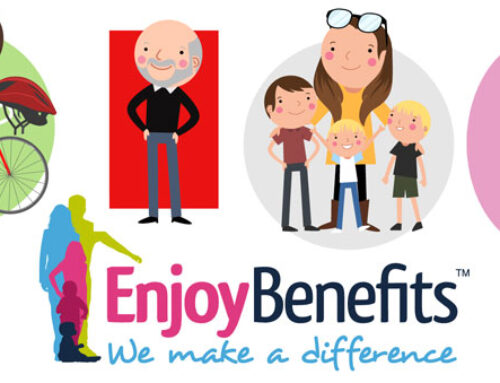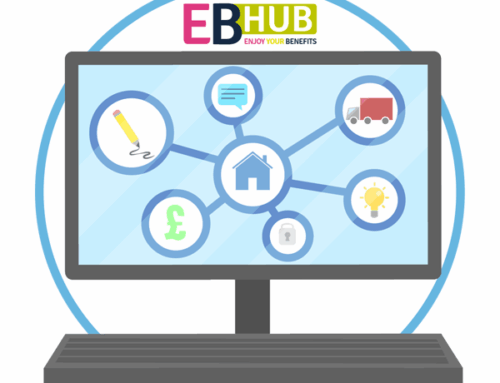With working from home becoming the new norm, it’s more important than ever that staff wellbeing is monitored as employees experience “pandemic fatigue” and “burnout”.
To gain an insight into the current business climate, we interviewed Samantha Latham, Business Development Manager at Enjoy Benefits. Sam works alongside a wide range of clients, varying from small start-ups with fewer than 5 people, to much larger organisations with 1000 plus employees. It’s her responsibility to set up and manage a client’s benefits platform, ensuring all staff are accounted for in the benefits offered.
Q: How have employers adapted to support their staff in the pandemic?
During the last 12 months, during Covid-related times, we’ve seen a switch in the support employers want to give their employees. It’s not necessarily just about physical things, it is about looking after their mental health and their well-being. Whether that’s an employee assistance programme where they’ve got somebody to talk to or a scheme to help them in their daily lives, we’ve been there to help employers and employees. In lockdown number one, we saw such a huge increase in cyclists and the interest in cycle-to-work, we actually put through double the amount of orders we would normally. And that was in the first month. And It just continued to grow because people found that, while things were shut they were still able to live a healthy lifestyle, going out on the bike with the kids.
Q: How does the employee assistance programme work?
It’s a health and well-being package that covers a bit of everything. If it’s anxiety or sleep [difficulties] or finances or just general wellness, there’s five or six different topics on there with little videos from a trained professional. There’s also a telephone assistance option, which is 24/7, offering all of your staff the option to talk to trained professionals where they will help you discuss things like home life, finances, even support for bereavement and divorce.
Mental health is massive at the moment because Covid’s had a huge impact on mental health. We’ve seen a big increase in it [employees using this programme] as the pandemic has gone on. Sometimes people don’t know who they’re supposed to talk to, and at times it’s easier to talk to somebody that you don’t know rather than trying to speak to a family member. And that’s where this comes in.
Q: Psychologists are reporting a rise in “pandemic fatigue” as many people find the loss of social contact hard, with more people feeling exhausted, stressed and unable to cope. How are current employers tackling this?
We’ve found that a lot of employers are looking at new ways to engage their employees because they’re not having the physical meetings that they might have had once a week in the office. Even we had to adjust how we do that with our own staff. And that is, by having virtual monthly lunch meetings where we provide the lunch, but obviously within the employee’s home. We have daily Zoom meetings with the team just to check in, because we’re very aware of how tough current times can be for people. I have a house full of people, however some people don’t. And a lot of employees are in exactly the same position. They may live on their own and they can’t go out and see their friends and family like they would typically do. So it’s important to keep that connection.
Q: Post-pandemic will see a lot more people work from home. How do you see the future of employee benefits post Covid?
Employers need to remember that they still have to look at the flexibility of people. Once people return to the office, are they going to continue to offer flexible working options? Are they going to continue to offer working from home? What we have found is because people are working remotely, the people that we need to speak to, whether that’s H.R. or finance, they have got the time to do that because it’s a little bit more relaxed with them being at home and kind of working to their own schedule. We’ve got one client most recently who has a start-up business, which last year had to delay their work because of what’s going on. They started to push forward with it this year as they now find themselves with more free time. And we have now set them up for payroll services because they didn’t have anything in place for that, pensions as well. Along with some of the health and well-being [schemes], things like private medical insurance, we’ve got that in place for them.
Working from home for many has seen a burnout, as people can’t separate work from the rest of their lives. But on the flip-side a lot of people now have much more time on their hands, they’re not having to commute every day, they’re perhaps now getting their shopping delivered, and so on. They may have finally found time to do something they’ve been wanting to do but not previously had the time to do.
Q: When you’re talking to new businesses, how do you come to an agreement over what benefits you’re going to be offering?
The first question I always ask them is, ‘has anybody come to them with anything?’ If somebody comes to you and says, ‘I’m really interested in this cycle to work scheme’, there you go. That’s an immediate flag that you’ve got a bit of [employee] engagement there. If they have an understanding from the get go, I tend to look at very similar sized businesses to theirs and explain to them what that company is offering and what kind of percentage uptake we would see.
I always say to them, ‘let’s have a look at what you need to have and what benefits are nice to have’. And then we kind of build it up from there. And I do always say to them, ‘no, we don’t offer set packages’. All of our companies are very, very different. I would never say to them, you have to choose package one, two or three. And you get kind of tied into that. It’s very much pick and mix, built around what their business needs. If they’ve got a young workforce, they will be interested in things like discounts because they want to get a Just-Eat at the weekend or they want to go out with friends and family, when they can. If they have got children, of course the Workplace Nursery scheme is a no brainer. It doesn’t cost the business anything, and the savings that can be made are huge. They can save up to 30 percent of nursery fees every month, which goes back into their pocket, it’s fantastic.
Q: The UK workforce is getting older. How are employers catering for multigenerational workforces in their benefits?
This goes back to and how we cater for everybody. You may have things like technology and mobile phones for your younger generation. Then there are things that you will obviously have for people of childbearing age with the childcare options. Then you tend to have things like, private medical insurance and you can offer an enhanced pension or pension through salary sacrifice. It does depend on the demographics of the company. We found out that even some of the older generation quite like discounts. They like to save money that way, so the discount hub is great because obviously they can save money even if it’s just at the weekly shop. And the more serious benefits are things like life insurance.
Q: Do you find when employers are recruiting, people are now looking to see whether a business offers staff benefits?
Whatever you’re offering your employees or potential employees, the staff benefits can mean a huge difference between them accepting a job or declining it because they want to know what else they’re getting out of the business. Do they have cover if they were to fall ill? Do they have a really good pension in place? We have found that, probably in the last few years, employees aren’t afraid to ask that question, they aren’t afraid to come forward and say, ‘I’m happy with the salary, but what else do I get?’ I think the employee benefits are more important now, more than ever, because it becomes kind of a support package for people.
Q: Apart from offering staff benefits, how else can employers look after their staff?
I’m a very big advocate of doing things like an employee survey or getting feedback. For instance, we give our employees an additional holiday for their birthday. I’ve got clients that offer free car parking or free refreshments on site, just little things like that they can make a big difference.
I always ask employers to look at what they’re offering right now. Is it working? Is it the best thing that they can offer? And then also what is the company hoping to get out of it? Are they always looking to recruit because they’ve got problems with staff turnover? If they have, have they asked that question when they are maybe doing an exit interview? Why are they leaving? Is it down to salary? Is it down to support in the workplace and things like that.





